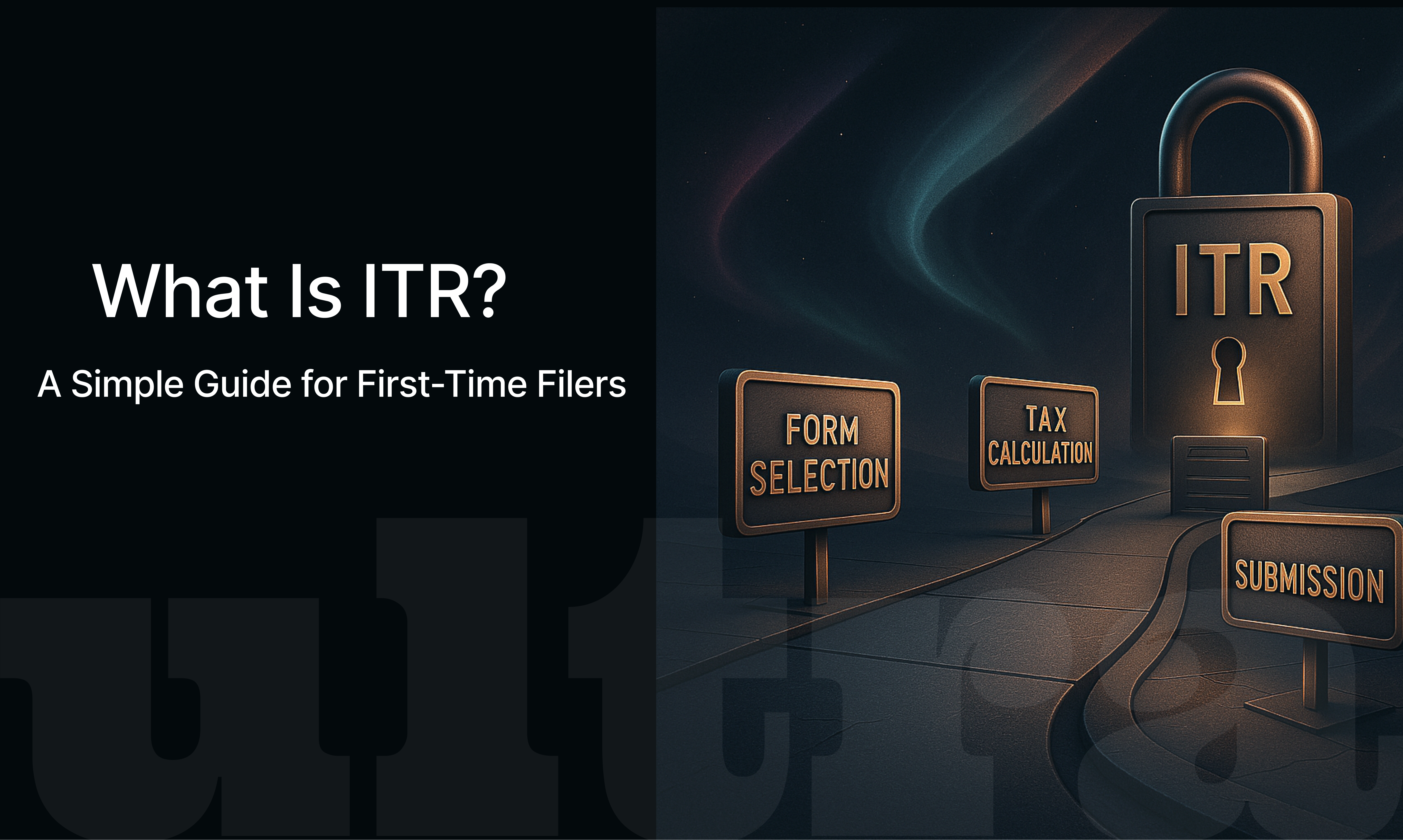What Is ITR? A Simple Guide for First-Time Filers
30 July 2025 · Sachin Gadekar
Understanding Income Tax Returns, Their Types, Filing Process, and Refunds in India

What Is ITR?
Filing your Income Tax Return (ITR) for the first time can seem overwhelming—but it doesn't have to be. Whether you're a salaried employee, freelancer, or investor, knowing how to file your ITR is crucial to staying compliant and unlocking potential tax benefits.
In this blog, we break down the meaning of ITR, types of ITR forms, the filing process, refund tracking, and essential FAQs to help you file your taxes with confidence.
ITR stands for Income Tax Return. It is a form filed with the Income Tax Department of India that declares your income, expenses, deductions, and taxes paid during a financial year.
What is Income Tax Return with Example?
Let’s say you earn ₹8,00,000 annually. You invest ₹1,50,000 under Section 80C, and pay ₹30,000 as tax deducted at source (TDS) by your employer. You’ll file an ITR to:
Declare income and deductions
Adjust tax paid vs tax payable
Claim a refund (if you paid extra)
ITR Full Form and Its Importance
ITR Full Form: Income Tax Return
Why Is ITR Filing Important?
Avoid penalties for non-filing
Claim TDS or advance tax refunds
Get faster loan or visa approvals
Maintain clean financial records
Even if your income is below the taxable limit, filing ITR can be beneficial for financial transparency.
Types of ITR Forms in India
There are seven ITR forms issued by the Income Tax Department. Here are the most commonly used ones:
1. ITR-1 (Sahaj):
For resident individuals with income up to ₹50 lakhs from salary, one house property, and other sources.
2. ITR-2:
For individuals/HUFs not having income from business or profession.
3. ITR-3:
For individuals/HUFs having income from business/profession.
4. ITR-4 (Sugam):
For presumptive income from business/profession up to ₹50 lakhs.
Each form serves a different income category. Choosing the correct form is critical for a valid return.
How to File ITR Online
Step-by-Step Guide to ITR Filing
1. Register/Login on the e-Filing Portal
Go to https://www.incometax.gov.in/iec/foportal/
Use your PAN as the User ID.
2. Choose the Right ITR Form
Based on your income type (salary, business, capital gains).
3. Enter Your Income Details
Fill in income from all sources: salary, interest, rent, etc.
4. Claim Deductions and Exemptions
Under Sections 80C to 80U.
5. Verify Tax Computation
Make sure TDS and advance taxes are reflected correctly.
6. E-verify Your ITR
Using Aadhaar OTP, net banking, or digital signature.
7. Submit and Save Acknowledgment
After verification, download the ITR-V acknowledgment for records.
ITR Login: Quick Access to Your Tax Dashboard
Your ITR login is available at the official Income Tax portal.
Go to the e-Filing portal
Use your PAN number and registered password
Access forms, ITR-V, refund status, and filed returns
How to Check ITR Refund Status
If you're eligible for a refund, you can check its status easily:
Visit https://www.incometax.gov.in/iec/foportal/
Login using PAN
Navigate to 'My Account' → 'Refund/Demand Status'
View refund issue date, amount, and current status
Refunds are usually credited within 7 to 45 days post e-verification.
When Is ITR Filing Mandatory?
You must file ITR if:
Your gross total income exceeds ₹2.5 lakh (for those under 60)
You are seeking a TDS refund
You have foreign assets or income
You want to carry forward capital losses
You are a director in a company or investor in unlisted shares
Penalties for Late ITR Filing
Failing to file ITR by the due date (usually 31st July) may attract:
Late filing fees up to ₹5,000 under Section 234F
Interest on unpaid taxes under Section 234A
Possible scrutiny or legal action for serious delays
Common Mistakes to Avoid While Filing ITR
Choosing the wrong ITR form
Not reporting all income sources
Forgetting to claim eligible deductions
Missing e-verification after submission
Using incorrect bank details for refund
Make sure to double-check all entries before final submission.
Benefits of Filing ITR Even If You’re Not Liable to Pay Tax
Serves as proof of income
Helps in loan applications
Useful for visa processing
Helps claim TDS refund
Ensures you stay tax-compliant
Conclusion: File Smart, File Early
Filing your ITR is more than just a tax compliance task—it’s a way to take control of your finances. Whether you’re salaried or self-employed, a first-timer or an investor, understanding how to file and track your ITR ensures transparency, accountability, and long-term financial planning. At Ultra, we believe in empowering investors with both knowledge and access to alternative opportunities—and that starts with financial literacy like this.
FAQs: What Is ITR and How It Works
1. What is the full form of ITR?
ITR stands for Income Tax Return.
2. What is ITR-1 used for?
ITR-1 is for salaried individuals with income up to ₹50 lakhs and limited other income.
3. How to get a copy of my ITR?
Login to the Income Tax portal → My Account → View Filed Returns → Download ITR-V.
4. How can I check my ITR refund status?
Log in to the Income Tax portal and go to the 'Refund/Demand Status' section.
5. Is it mandatory to file ITR every year?
If your income exceeds the basic exemption limit or you want a refund, yes.